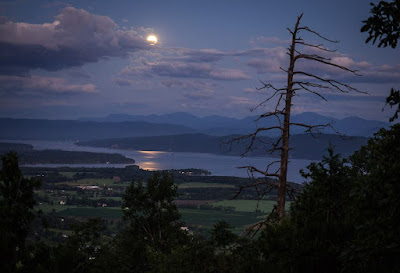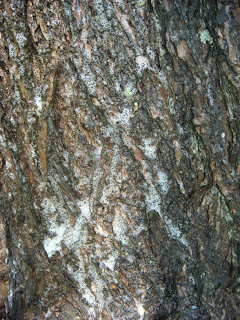Vermont State Parks Night Sky Watch Part 2: Planets, Meteors, and Zodiacal Lights, Oh My!

Hopefully some of you were able to catch some of the Perseid Meteor Shower that we wrote about a couple weeks ago. I sat outside for about a half an hour on that Thursday night and saw several meteors, which was a fun experience. (I tried again the following night, but it was much cloudier and I soon gave up.)
But never fear, astronomy fans, there are still cool things
to look at in the night sky over the next few weeks. Plus, predicted clear
skies and a new moon will make for prime stargazing conditions. Here is a rundown
of a few things to look for if you find yourself outside at night:
Planets in Formation
On September 3rd, Jupiter, Venus and our moon
will line up to provide a special sight for viewers (and a great photo-op!) Look
to the west about a half an hour after sunset. The thin crescent moon should be
visible, with Venus and Jupiter to the lower right, close to the horizon.
The Pleiades, or “Seven Sisters”
Look eastward above the horizon and you should be able to
spot a bright cluster of stars- the Pleiades. The Seven Sisters are usually
easy to spot, even in towns and areas without completely dark sky at night. Many
of us in Vermont are lucky enough to have these kinds of dark, clear skies quite often, so we should get a
very good view.
Southern Sights
In the southern sky between dusk and midnight, you will be able to see what is known as the "celestial triangle", a bright shape comprising of the star Antares, and the planets Mars and Jupiter. Also, facing southeast in the hours before dawn, you can catch a glimpse of Orion the hunter.
Southern Sights
In the southern sky between dusk and midnight, you will be able to see what is known as the "celestial triangle", a bright shape comprising of the star Antares, and the planets Mars and Jupiter. Also, facing southeast in the hours before dawn, you can catch a glimpse of Orion the hunter.
Aurigid Meteor Shower
Much smaller than the Perseid, but still a chance to see
some meteors. This one will peak before dawn tonight, on August 31st.
Starting the week of September 4th, those of us
in the Northern Hemisphere have a higher than average chance of seeing a rare
phenomenon called the Zodiacal Lights. This occur when the sun reflects off of
interplanetary dust in the plane of our Solar System, and so named because the
dust cloud is concentrated towards the zodiac or ecliptic. Look for a faint, pyramid
shaped glow in the east above the horizon. This is an uncommon sight to see,
and requires a totally dark, moonless sky.. such as what you find in most state parks. If you happen to see this sight, take a picture!
And, here are a couple of more bonus parks we recommend for star
and sky-gazing:
Lake Carmi State Park
Open until Columbus Day, this large park is located in the
rural northwest part of the state, which means minimal light pollution and
clear skies!
Ricker Pond State Park
Ricker Pond is also open until Columbus Day, and is a
popular park for families and those looking for a relaxing, quiet camping
experience. This, plus the location in the remote and woodsy Groton State
Forest translates to a peaceful place with plenty of quiet spots to sit or lie
back and watch the sky above you.
Woodford State Park
Not far from the Massachusetts border, but located in the middle of the Green Mountain National Forest, Woodford is a perfect choice for those in the southern part of the state who also want a quiet experience and clear dark skies.
Woodford State Park
Not far from the Massachusetts border, but located in the middle of the Green Mountain National Forest, Woodford is a perfect choice for those in the southern part of the state who also want a quiet experience and clear dark skies.


.jpg)
.jpg)
Comments
Post a Comment
Feel free to let us know what you think.